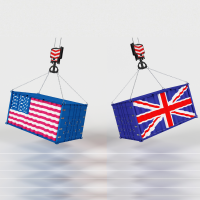
The first half of 2025 has seen significant activity around US trade tariffs, with recent policy changes and evolving trade discussions adding new layers of complexity for UK businesses exporting to the United States. Understanding these developments is crucial for companies looking to protect their supply chains, manage costs, and ensure compliance in this dynamic environment.
Recent Tariff Developments:
Since early 2025, the US Trade Representative’s office has introduced updates affecting tariffs on a variety of goods, reflecting broader shifts in trade policy priorities. Among the most notable changes:
-
Revisions to Section 232 tariffs: The US government has adjusted tariffs on certain steel and aluminium imports, including those originating from the UK, following ongoing reviews aimed at balancing domestic industry protection with international trade commitments. While some tariff rates have been reduced or temporarily suspended on specific product lines, others remain in place, requiring exporters to stay vigilant.
-
Tariff exclusions and extensions: There have been several rounds of tariff exclusion renewals for particular industrial components and raw materials critical to manufacturing supply chains. These temporary reliefs offer UK exporters opportunities to mitigate cost impacts but come with strict compliance criteria and deadlines.
-
Increased focus on digital trade and customs modernisation: In parallel with physical goods tariffs, new regulations on customs procedures and digital trade facilitation have emerged, driven by the push for streamlined cross-border operations and enhanced enforcement of trade compliance.
UK–US Trade Agreement Progress:
Negotiations on a comprehensive UK–US trade deal continue to shape tariff and customs policy expectations.
An executive order has recently been signed between the UK and US which will reduce tariffs on some British goods entering the US. The order will cut the 25% tax on UK cars to 10% for a maximum of 100,000 UK cars, any cars over this will be subject to 27.5%.
For the first time, the US has committed to reducing tariffs on UK aerospace goods such as engines and similar aircraft parts from the general 10% tariff being applied to all other countries, which is expected to come into force by the end of the month.
Thanks to the UK-US deal, the UK is the only country to be exempt from the global tariff of 50% on steel and aluminium. As the Prime Minister and President Trump have again confirmed, we will continue to go further and make progress towards 0% tariffs on core steel products as agreed.
Also agreed is reciprocal access to 13,000 metric tonnes beef for both US and British farmers – meaning the UK can export to the US too. Any US imports will need to meet UK food safety standards.
Both countries remain focused on securing significantly preferential outcomes for the UK pharmaceutical sector and work will continue to protect industry from any further tariffs imposed as part of Section 232 investigations.
Implications for UK Exporters:
For UK businesses, these tariff updates mean:
-
Supply chain reassessment: Companies need to evaluate their exposure to current tariffs and potential future changes, considering alternative sourcing or logistics strategies.
-
Pricing and margin management: Understanding tariff costs and exemptions can inform more accurate pricing models and contract terms with US customers.
-
Compliance vigilance: Staying updated on customs regulations and tariff classifications is essential to avoid penalties and delays.

View the British Chambers of Commerce US Tariffs Explainer
US Trade Tariffs Webinar
To help UK businesses navigate this evolving landscape, our upcoming webinar on Monday 7 July, 2.00pm – 3.00pm (via Zoom) will feature expert insights from Richard Bartlett of Export Unlocked and Angela Aaron of KlearNow AI. They will unpack:
-
The most recent US tariff changes and their direct impact on UK exporters
-
The latest developments in the UK–US trade deal negotiations
-
Practical steps to build resilient, tariff-savvy supply chains for 2025 and beyond
This session is an essential opportunity to gain clarity and actionable advice on adapting your trade strategy in response to these rapid changes. FREE to Members
Register now and prepare your business for success in the evolving US trade environment.





